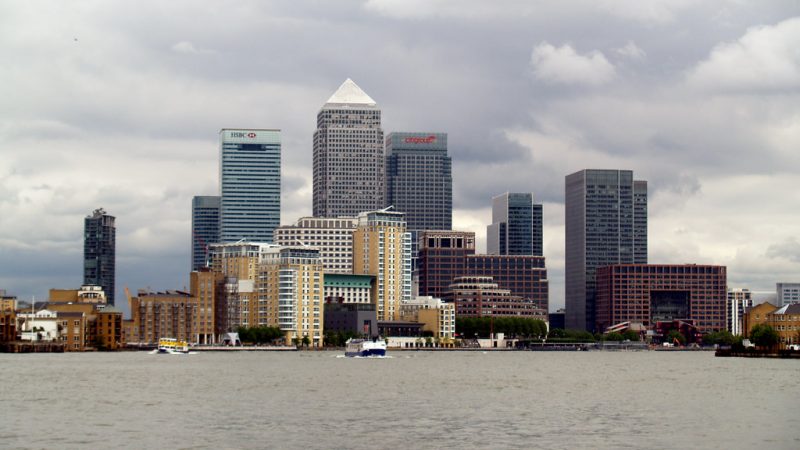'In pursuit of the high returns in the shortest possible time, the finance industry has moved into the high street.'

Prem Sikka is an Emeritus Professor of Accounting at the University of Essex and the University of Sheffield, a Labour member of the House of Lords, and Contributing Editor at Left Foot Forward.
Global finance is strangling the UK economy, but the government wants more of it. Almost every law is being bent to promote the interests of the City of London. The latest is the Financial Services and Markets Bill which requires regulators to promote ‘growth’ and international ‘competitiveness’ of the finance industry in addition to the primary objective of financial stability and consumer protection.
The competitiveness objective was abandoned after the 2007-08 financial crash as it encouraged fraud, reckless risk-taking; wafer-thin capital requirements and regulators just aped the three unwise monkeys. It is now being resuscitated without any reflections on history, current practices or social impact.
The danger signs are all there. The chairman of the Financial Conduct Authority (FCA) told the House of Commons Treasury Committee: “The risk [is] that whenever we propose to do something, we receive a large amount of lobbying input saying this rule doesn’t exist in this country or that country or the other country, and therefore you shouldn’t do it”. In other words, the government is unleashing the race-to-the-bottom. Former chair of the Financial Services Authority (FSA), predecessor of the FCA, said that “it is a mistake to give the regulators of the finance sector a competitiveness objective.” But the government won’t listen and dances to the tune of City grandees.
That a race-to-the-bottom will be an inevitable feature in pursuit of growth and competitiveness can be in no doubt. Just this week, the FCA announced that it is considering easing rules in an attempt to persuade Japanese-owned Cambridge-based technology firm Arm Holdings to list its shares on the London Stock Exchange (LSE) alongside the New York Stock Exchange. The disclosure rules on “related party transactions” i.e. transactions between parent and subsidiary companies, between the company and its directors and their families, major creditors and debtors would be relaxed. This would increase opacity and provide cover for profit shifting, tax avoidance and illicit financial flows. The listing on LSE facilitates share trading but does not improve investment. Money from the sale of secondary securities merely passes from A to B to C to D, and does not go into productive assets.
The growth of the finance industry has financialised everything through more debt, speculation and financial instruments. So, how much debt can the UK economy sustain? Government borrowing is already at £2.504 trillion or, 99.5% of GDP. The household debt is around £2 trillion and corporate debt is another £2.5 trillion. The scope for growth through increased borrowing is severely constrained and will require a return to reckless lending practices.
In pursuit of the high returns in the shortest possible time, the finance industry has moved into the high street. Private equity has used tax dodges, artificial loans and asset-stripping to generate high returns and devour businesses. Famous names, such as Debenhams, Bernard Matthews, Maplin, Toys “R” Us, HMV, Poundworld, Bonmarche, Cath Kidston, Comet, Flybe, Monarch Airlines and Payless Shoes, just to mention a few, have been laid to waste. Town centres have become economic deserts. Thousands of jobs have been lost. Private equity now owns grocery stores, such as Asda and Morrisons. What next?
The healthcare sector has been financialised. Care homes, often seen as prime development sites, have been taken-over by private equity and are run for profit rather than care for patients. Profits are generated through financial engineering, tax avoidance, low wages and a high level of deliberately unfilled vacancies. This delivers record profits, dividends and executive pay, but poor care for residents.
Thames Water has long been controlled by private equity and hedge funds. It has shifted profits and dodged taxes. Due to low investment, vast quantities of water are lost every day through leaks and water companies dump raw sewage in rivers, endangering biodiversity, marine and human life. Shareholders and executives do nicely whilst customers pay higher bills.
Banks, hedge funds, private equity and pension funds bet on food prices in financial markets, causing price swings in staple foods such as wheat, corn and maize. They have no interest in physical purchase of food, but gamble through complex futures contracts and derivatives in the hope that prices will go up and they will make a quick profit. The result is higher prices and starvation for millions.
The above are just a few examples of how the finance curse is devouring towns and households. Yet the government wants more of it, which will inevitably crowd out the development of other sectors. The rise of the finance sector has been paralleled by the decline of manufacturing which often requires long-term investment. In 1970, manufacturing’s share of UK economic output (in terms of Gross Value Added) was 27%, compared to 9.7% in 2021.
UK economic policy is constructed around the interests of giant financial corporations and their controllers who have no loyalty to any country, place, people or product. As Nick Shaxson observes, “today, around a third of all corporate profits flow to finance”. Why produce something, if profits can be made quickly via speculation? Yet the government is prioritising more of the same. It will not increase resilience of the UK economy or improve people’s living standards.
(Picture credit: Grumbler%: Creative Commons)
To reach hundreds of thousands of new readers we need to grow our donor base substantially.
That's why in 2024, we are seeking to generate 150 additional regular donors to support Left Foot Forward's work.
We still need another 117 people to donate to hit the target. You can help. Donate today.



